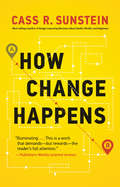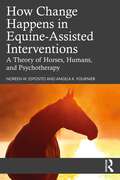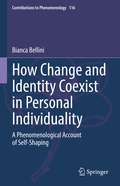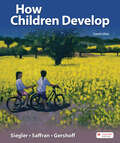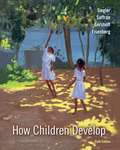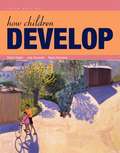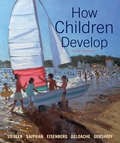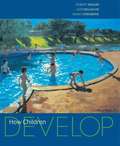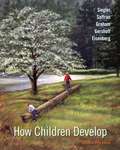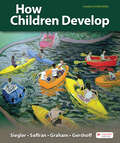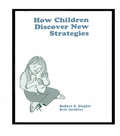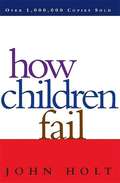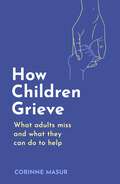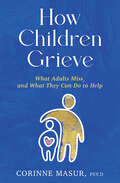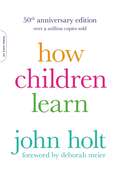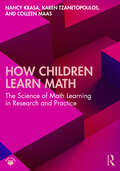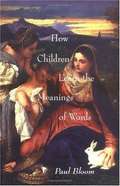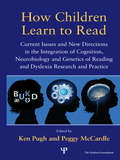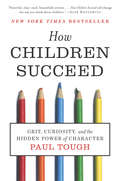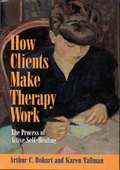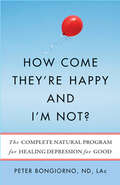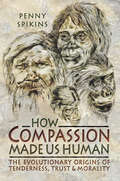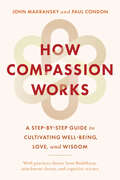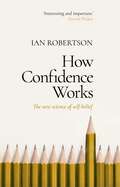- Table View
- List View
How Change Happens (The\mit Press Ser.)
by Cass R. SunsteinThe different ways that social change happens, from unleashing to nudging to social cascades."Sunstein's book is illuminating because it puts norms at the center of how we think about change."—David Brooks, The New York TimesHow does social change happen? When do social movements take off? Sexual harassment was once something that women had to endure; now a movement has risen up against it. White nationalist sentiments, on the other hand, were largely kept out of mainstream discourse; now there is no shortage of media outlets for them. In this book, with the help of behavioral economics, psychology, and other fields, Cass Sunstein casts a bright new light on how change happens.Sunstein focuses on the crucial role of social norms—and on their frequent collapse. When norms lead people to silence themselves, even an unpopular status quo can persist. Then one day, someone challenges the norm—a child who exclaims that the emperor has no clothes; a woman who says “me too.” Sometimes suppressed outrage is unleashed, and long-standing practices fall. Sometimes change is more gradual, as “nudges” help produce new and different decisions—apps that count calories; texted reminders of deadlines; automatic enrollment in green energy or pension plans. Sunstein explores what kinds of nudges are effective and shows why nudges sometimes give way to bans and mandates. Finally, he considers social divisions, social cascades, and “partyism,” when identification with a political party creates a strong bias against all members of an opposing party—which can both fuel and block social change.
How Change Happens in Equine-Assisted Interventions: A Theory of Horses, Humans, and Psychotherapy
by Angela K. Fournier Noreen W. EspositoHow Change Happens in Equine-Assisted Interventions gives clinicians and researchers an intervention theory on the mechanisms of change during psychotherapy and other interventions that incorporate horses. Chapters introduce the concept of intervention theory, present a theory of the problem (what the client comes with), theories explaining the intervention (what is done during a session), and theories of change (what happens in the mind of a client), with each theory’s function described. Using an autoethnographic approach, the authors describe, deconstruct, and analyze personal experiences as clients during an equine-assisted intervention. Then the authors present and apply a unique intervention theory by linking it to the thoughts and experiences of clients in and after a session. Practitioners will come away from this book with a unique perspective on the field and with an increased understanding of what their clients are thinking both in and out of session. Researchers will have an explanatory theory from which to draw testable hypotheses when studying interventions incorporating horses.
How Change and Identity Coexist in Personal Individuality: A Phenomenological Account of Self-Shaping (Contributions to Phenomenology #116)
by Bianca BelliniThis book purports to devise a pattern of the self that accounts for the role that change and identity play in self-shaping. It focuses on the process through which we discover, know and shape ourselves and wonder whether there is a core of our individuality and how we should account for it. The core is described along with its range of possible variations and its constraints. This volume provides arguments on how individual essence – far from being something monolithic – is inherently dynamic.The text delves into the link between change and identity in self-shaping, arguably the fundamental issue of personal individuality. Different theories and standpoints are addressed and scrutinized. Descriptive phenomenology will enter along with Max Scheler’s stance on axiology, as well as the keystones that account for self-shaping. This book appeals to students and researchers working on the implications of phenomenology for self identification and personal individuality.
How Children Develop
by Nancy Eisenberg Robert S. Siegler Elizabeth Gershoff Campbell Leaper Jenny SaffranHow Children Develop, Seventh Edition, is the trusted introduction to child development from a team of leading teachers and researchers.
How Children Develop
by Nancy Eisenberg Robert Siegler Elizabeth Gershoff Jenny SaffranHow Children Develop has established itself as the topically organized textbook teachers and researchers trust for the most up-to-date perspectives on child and adolescent development. The authors, each a well-known scientist and educator - have earned that trust by introducing core concepts and impactful discoveries with an unparalleled integration of theory, cultural research, and applications, all in a style that is authoritative yet immediately understandable and relevant to students. <p><p> The new edition has been rigorously updated and welcomes co-author Elizabeth Gershoff (The University of Texas at Austin), who brings a breadth of research and teaching experience to the discussions of social and emotional development. It is also more interactive than ever before, with richer integration between the book and its interactive study features in LaunchPad.
How Children Develop
by Nancy Eisenberg Robert S. Siegler Judy S. DeLoacheWorth is proud to publish the Third Edition of How Children Develop by Robert S. Siegler, Judy S. DeLoache, and Nancy Eisenberg—the leading textbook for the topically-organized child development course. Providing a fresh perspective on the field of child development, the authors emphasize fundamental principles, enduring themes, and important recent studies to provide a unique contribution to the teaching of child development.
How Children Develop (Fifth Edition)
by Nancy Eisenberg Judy Deloache Robert Siegler Jenny R. Saffran Elizabeth Gershoff Campbell LeaperHow Children Develop has established itself as the topically organized textbook teachers and researchers trust for the most up-to-date perspectives on child development. The authors, each a well-known scientist and educator--have earned that trust by introducing core concepts and impactful discoveries with an unparalleled integration of theory, cultural research, and applications, all in a style that is authoritative yet immediately understandable and relevant to students. The new edition has been rigorously updated and welcomes co-author Elizabeth Gershoff (The University of Texas at Austin), who brings a breadth of research and teaching experience to the discussions of social and emotional development. It is also more interactive than ever before, with richer integration between the book and its interactive study features in LaunchPad.
How Children Develop (First Edition)
by Nancy Eisenberg Judy Deloache Robert SieglerCollege textbook about child development.
How Children Develop, Canadian Edition
by Nancy Eisenberg Robert S. Siegler Elizabeth Gershoff Susan Graham Jenny SaffranHow Children Develop continues to be the topically arranged textbook that teachers and researchers trust for the most up to date perspectives on the field of child development. The book has also been fully adapted for a Canadian audience with special attention to Canadian research and topics of special relevance, offering Canadian readers an organic and engaging reading experience. This edition is also more interactive than ever before with a full suite of media for students to learn and practice the material in the LaunchPad course space. In addition to the full eBook, students have access to the book’s celebrated video program, the LearningCurve adaptive quizzing system with a personalized study plan, and other activities.
How Children Develop, Canadian Edition
by Nancy Eisenberg Robert Siegler Elizabeth Gershoff Susan Graham Jenny SaffranHow Children Develop, Seventh Edition, is the trusted introduction to child development in Canada from a team of leading teachers and researchers.
How Children Discover New Strategies (Distinguished Lecture Series)
by Robert Siegler Eric A. JenkinsThis well-documented book divides the process of constructing new problem-solving strategies into two parts: discovery of the new strategy, and its generalization to new contexts. By using a trial-by-trial analysis, the authors are able to identify the exact trial on which the new strategy is first used, the circumstances that lead to the discovery, and the generalization of the strategy beyond its initial use. These observations disconfirm popular stereotypes of the discovery process and provide important insights into the nature of long-term learning and strategy discovery.
How Children Fail (Classics In Child Development Series)
by John HoltFirst published in the mid 1960s, How Children Fail began an education reform movement that continues today. <P><P>In his 1982 edition, John Holt added new insights into how children investigate the world, into the perennial problems of classroom learning, grading, testing, and into the role of the trust and authority in every learning situation. His understanding of children, the clarity of his thought, and his deep affection for children have made both How Children Fail and its companion volume, How Children Learn, enduring classics.
How Children Grieve: What Adults Miss And What They Can Do To Help
by Corinne MasurAn informative, empathetic and accessible guide to understanding childhood grief at every age, which will help caretakers to support children mourning after loss.From Dr Corinne Masur, an award-winning clinical psychologist specialising in grief and mourning, comes a necessary and impactful guide to understanding children's grief from the inside and to guiding children through loss, from the death of a parent and other family members, to the loss of friends, pets and even the family home. Dr Masur describes how to understand, help and guide children at each age and stage of development and uses her own childhood experience with loss through empathetic yet clinically informed advice.When Dr Masur was fourteen years old, her father died. Like most children and teens facing loss, Masur didn't know how to handle her grief, and she was never encouraged to acknowledge or share what she was feeling with her family, teachers or friends. Her experience of shock and emotional paralysis around her loss is what led her to become an expert in childhood grief in order to help grieving children and to help others to support the children in their lives who have experienced loss. As a psychologist and child psychoanalyst, Dr Masur has helped many children recognise and express their feelings after loss. In How Children Grieve, Masur shares her expertise with caregivers of all kinds, giving them the tools they need to help a child or teenager to mourn, to move forward and to make meaning of terrible loss.
How Children Grieve: What Adults Miss, and What They Can Do To Help: A Guide for Parents, Teachers, Therapists, and Caregivers to Help Children Deal with Death, Divorce, and Moving
by Corinne MasurUnderstand how children process grief at every age and stage of development in this accessible guide for parents and caretakers.An award-winning childhood grief expert shares clinically-informed advice for supporting kids and teens through difficult times—from family deaths and lost pets to unexpected moves, and beyond.A necessary and impactful guide to understanding children's grief from the inside and to guiding children through loss, from the death of a parent and other family members, to the loss of friends, pets, and even the family home. Dr. Masur, an award-winning clinical psychologist specializing in grief and mourning, describes how to understand, help, and guide children at each age and stage of development and uses her own childhood experience with loss through empathetic yet clinically informed advice.When Dr. Masur was fourteen years old, her father died. Like most children and teens facing loss, Masur didn&’t know how to handle her grief, and she was never encouraged to acknowledge or share what she was feeling with her family, teachers, or friends. Her experience of shock and emotional paralysis around her loss is what led her to become an expert in childhood grief in order to help grieving children and to help others to support the children in their lives who have experienced loss. As a psychologist and child psychoanalyst, Dr. Masur has helped many children recognize and express their feelings after loss. In How Children Grieve, Masur shares her expertise with caregivers of all kinds, giving them the tools they need to help a child or teenager mourn, move forward, and make meaning of terrible loss.
How Children Learn
by John HoltThis enduring classic of educational thought offers teachers and parents deep, original insight into the nature of early learning. John Holt was the first to make clear that, for small children, “learning is as natural as breathing.” In this delightful yet profound book, he looks at how we learn to talk, to read, to count, and to reason, and how we can nurture and encourage these natural abilities in our children.”
How Children Learn Math: The Science of Math Learning in Research and Practice
by Nancy Krasa Karen Tzanetopoulos Colleen MaasWritten for pre-service and in-service educators of children in preschool through grade five, this book connects research in cognitive development and math education to offer an accessibly written and practical introduction to the science of elementary math learning. Structured according to children’s mathematical development, How Children Learn Math systematically reviews and synthesizes the latest developmental research on mathematical cognition into accessible sections that explain both the scientific evidence available and its practical classroom application. Written by an author team with decades of collective experience in cognitive learning research, clinical learning evaluations, and classroom experience working with both teachers and children, this amply illustrated text offers a powerful resource for understanding children’s mathematical development, from quantitative intuition to word problems, and helps readers understand and identify math learning difficulties that may emerge in later grades. Aimed at pre-service and in-service teachers and educators with little background in cognitive development, the book distills important findings in cognitive development into clear, accessible language and practical suggestions. The book therefore serves as an ideal text for pre-service early childhood, elementary, and special education teachers, as well as early career researchers, or as a professional development resource for in-service teachers, supervisors and administrators, school psychologists, homeschool parents, and other educators.
How Children Learn the Meanings of Words
by Paul BloomThe acquisition of word meaning is one of the fundamental issues in the study of mind. According to Paul Bloom, children learn words through sophisticated cognitive abilities that exist for other purposes.
How Children Learn to Read: Current Issues and New Directions in the Integration of Cognition, Neurobiology and Genetics of Reading and Dyslexia Research and Practice (Extraordinary Brain Series)
by Ken Pugh Peggy McCardleThis book brings together in one volume information about the neurobiological, genetic, and behavioral bases of reading and reading disabilities. In recent years, research on assessment and treatment of reading disability (dyslexia) has become a magnet for the application of new techniques and technologies from neuroscience, cognitive psychology, and cognitive neuroscience. This interdisciplinary fusion has yielded numerous and diverse findings regarding the brain basis of this syndrome, which are discussed in this volume by leading researchers. Intervention approaches based on such research are presented. The book also calls for research in specific directions, to encourage the field to continue moving into the bold frontier of how the brain reads. The volume is essential reading for a range of researchers, clinicians, and other professionals interested in reading and reading disability, and also commemorates the tenth anniversary of the Extraordinary Brain Conferences hosted by The Dyslexia Foundation.
How Children Learn, 50th anniversary edition (A Merloyd Lawrence Book)
by John HoltFrom the preface by Deborah Meier:"We have a long way to go to make John Holt's dream available to all children. But his books make it possible and easier for many of us to join him in the journey."In this enduring classic, rich with deep, original insight into the nature of early learning, John Holt was the first to make clear that, for small children, "learning is as natural as breathing." In his delightful book he observes how children actually learn to talk, to read, to count, and to reason, and how, as adults, we can best encourage these natural abilities in our children.
How Children Succeed: Rethinking Character and Intelligence
by Paul Tough<P>Why do some children succeed while others fail? <P>The story we usually tell about childhood and success is the one about intelligence: success comes to those who score highest on tests, from preschool admissions to SATs. <P>But in How Children Succeed, Paul Tough argues that the qualities that matter most have more to do with character: skills like perseverance, curiosity, conscientiousness, optimism, and self-control. <P>How Children Succeed introduces us to a new generation of researchers and educators who, for the first time, are using the tools of science to peel back the mysteries of character. Through their stories--and the stories of the children they are trying to help--Tough traces the links between childhood stress and life success. He uncovers the surprising ways in which parents do--and do not--prepare their children for adulthood. And he provides us with new insights into how to help children growing up in poverty. <P>Early adversity, scientists have come to understand, can not only affect the conditions of children's lives, it can alter the physical development of their brains as well. But now educators and doctors around the country are using that knowledge to develop innovative interventions that allow children to overcome the constraints of poverty. And with the help of these new strategies, as Tough's extraordinary reporting makes clear, children who grow up in the most painful circumstances can go on to achieve amazing things. <P>This provocative and profoundly hopeful book has the potential to change how we raise our children, how we run our schools, and how we construct our social safety net. It will not only inspire and engage readers, it will also change our understanding of childhood itself.
How Clients Make Therapy Work: The Process of Active Self-Healing
by Karen Tallman Arthur BohardOffers an integrative and constructive view of the client as the primary agent of change in psychotherapy. Covers the spectrum, including difficult and despairing clients. For therapists and residents.
How Come They're Happy and I'm Not?: The Complete Natural Program for Healing Depression for Good
by Peter BongiornoA proven, science-based, holistic approach to beating depression and feeling good—without medication—from the author of Put Anxiety Behind You. For many people who suffer from depression and anxiety, prescription drugs have either not been effective or have produced intolerable side effects. Now, naturopathic doctor and acupuncturist Peter Bongiorno, ND, LAc, offers a drug-free approach for healing depression in How Come They&’re Happy and I&’m Not. Bongiorno explains that depression and chronic low moods often have roots in physical ailments: inflammation, digestive problems, poor nutrient absorption, or disease. Depression can also be brought on by spiritual concerns, life events, or simply insufficient resources in dealing with day-to-day stress. Bongiorno&’s integrative, natural approach to psychology and healing, which he has used successfully with his own patients, features a personalized approach that includes: Working with your doctor to identify underlying causes of depression with blood tests and dietary changesBotanical medicines, yoga, massage, and acupuncture pointsA treatment plan based on your particular symptoms and circumstances
How Compassion Made Us Human: The Evolutionary Origins of Tenderness, Trust & Morality
by Penelope SpikinsAn intriguing look at how our capacity to care about and connect with others has contributed to our evolutionary success as a species. Our ability to care about the wellbeing of others, whether they are close family or strangers, can appear to be unimportant in today&’s competitive societies. But in this volume, archaeologist Penny Spikins argues that compassion lies at the heart of what makes us human. She takes us on a journey from the earliest Stone Age societies two million years ago to the lives of Neanderthals in Ice Age Europe, using archaeological evidence to illustrate the central role that emotional connections had in human evolution. Simple acts of kindness left to us from millions of years ago provide evidence for how social emotions and morality evolved, and how our capacity to reach out beyond ourselves into the lives of others allowed us to work together for a common good—and form the basis for human success.
How Compassion Works: A Step-by-Step Guide to Cultivating Well-Being, Love, and Wisdom
by John Makransky Paul CondonUncover your innate capacity for love, presence, and wisdom with compassion training adapted from Tibetan Buddhism and contemporary psychology.Everything we care about—our mental and physical well-being, our relationships, our spiritual life, our ability to be useful to others—depends on our ability to access love and compassion within ourselves first. This clear, step-by-step guide offers a way to cultivate this power through an evidence-based meditation method called Sustainable Compassion Training (SCT). With practices drawn from Tibetan traditions, attachment theory, and cognitive science, How Compassion Works uses a progressive series of meditations to gradually build our capacity for mindfulness and presence—and to help us avoid empathic distress, compassion fatigue, or burnout. Organized into three categories—receptive mode, deepening mode, and inclusive mode—these practices help us cultivate unconditional care and discernment from within. With a flexible framework that allows practitioners to integrate their own religious or spiritual beliefs, this book offers practices suitable for people of all faiths and those seeking a purely secular path.
How Confidence Works: The new science of self-belief
by Ian Robertson* Confidence makes your brain work better and boosts your performance* Confidence acts like a mini-antidepressant, lifting your mood* Confidence is contagious* Confidence is anxiety's greatest antidote* Confidence is a set of habits that feel fake at first but become real with practice* Confidence makes boys bullsh*t more than girls* Overconfidence can have disastrous consequences_________'Brilliant ... it will change how you think about confidence.' Johann Hari'Important for everyone but crucial for women.' Mary Robinson'Interesting and important.' Steven Pinker__________Imagine we could discover something that could make us richer, healthier, longer-living, smarter, kinder, happier, more motivated and more innovative. Ridiculous, you might say... What is this elixir?Confidence.If you have it, it can empower you to reach heights you never thought possible. But if you don't, it can have a devastating effect on your future. Confidence lies at the core of what makes things happen.Exploring the science and neuroscience behind confidence that has emerged over the last decade, clinical psychologist and neuroscientist Professor Ian Robertson tells us how confidence plays out in our minds, our brains and indeed our bodies. He explains where it comes from and how it spreads - with extraordinary economic and political consequences. And why it's not necessarily something you are born with, but something that can be learned.__________'Rich stories and change-inspiring examples for every kind of performer.' Pippa Grange'Appealing... ranges from neuroscience to politics.' Nature
